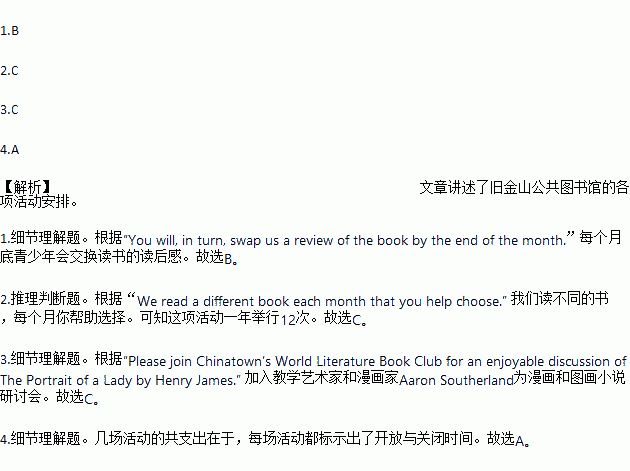题目内容
Teens Spring Events at San Francisco Public Library
GREAT TEEN BOOK SWAP
Sunday, March 19, 2017— 2:30 p.m. to 5:30 p.m.
FREE book! Just leave us a review.
Here’s how it works: Every Thursday, the librarian will bring out several books and allow teens the chance to look through them for one that you’d like to keep. You will, in turn, swap us a review of the book by the end of the month.
For ages 12— 18.
For more information, contact Dorcas at dorcas.wong@sfpl.org.
THE MIX BOOK CLUB!
Sunday, March 19, 2017— 4:00 p.m. to 5:00 p.m.
Teens aged 13— 18 are welcome to The Mix at SFPL Book Club! We read a different book each month that you help choose. This month we’re reading The Sun is Also A Star, by Nicola Yoon. New members and drop-ins are always welcome!
For more information, please e-mail catherine.cormier@sfpl.org or call (415)557-4404.
THE PORTRAIT OF A LADY BY HENRY JAMES
Sunday, March 19, 2017— 6:30 p.m. to 8:30 p.m.
Please join Chinatown’s World Literature Book Club for an enjoyable discussion of The Portrait of a Lady by Henry James. This famous novel follows the young, free-spirited heiress, Isabel Archer, as she travels from New York to Europe.
CARTOONING & GRAPHIC NOVEL WORKSHOP
Saturday, March 25, 2017— 2:00 p.m. to 4:00 p.m.
Join teaching artist and cartoonist Aaron Southerland for a cartooning and graphic novel workshop. Students will learn to create their very own cartoon and comic characters through advanced drawing techniques.
This is a Reading, Writing & Poetry program from SFPL. We love reading/ sharing/ creating words.
1.What will teens have to do at GREAT TEEN BOOK SWAP?
A. Exchange a book of their own.
B. Share a review of the book they choose.
C. Look through some books they keep.
D. Contact Dorcas at dorcas.wong@sfpl.org.
2.What can we infer about THE MIX BOOK CLUB?
A. Writers read their books to participants.
B. Only those who book seats are welcome.
C. This event takes place 12 times a year.
D. Nicola Yoon, a writer, will help choose books.
3.What will happen at Chinatown’s World Literature Book Club?
A. Drawing contests.
B. Writing.
C. Discussion.
D. Character creating.
4.What is mentioned in each event?
A. Opening and closing hours.
B. Names of the books to be read.
C. Book reviews.
D. Teens’ ages.
 阅读快车系列答案
阅读快车系列答案

 288 per week.
288 per week.